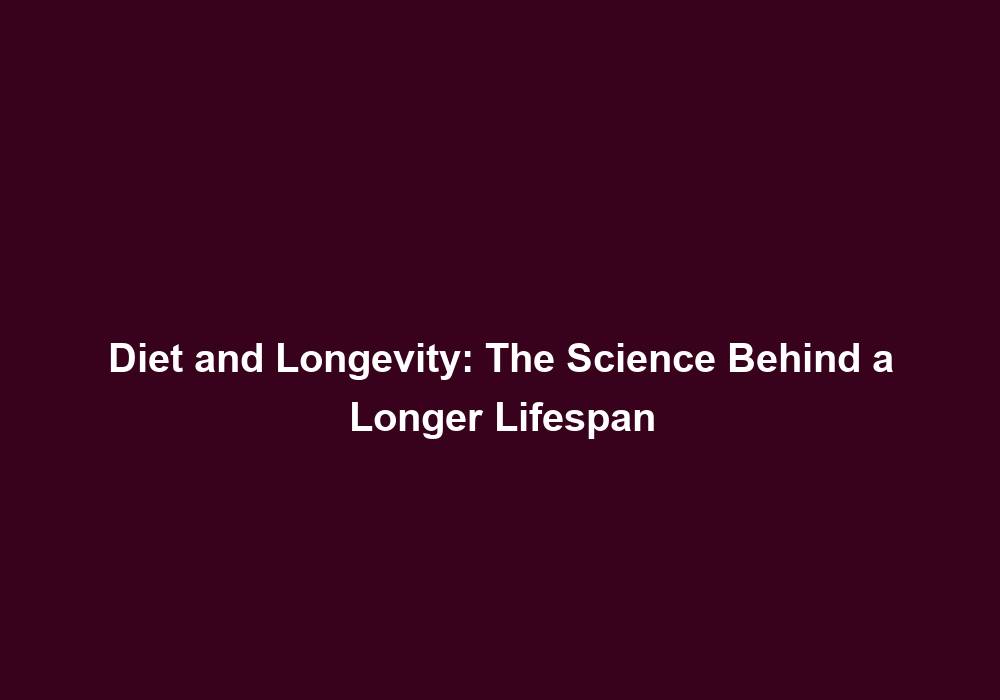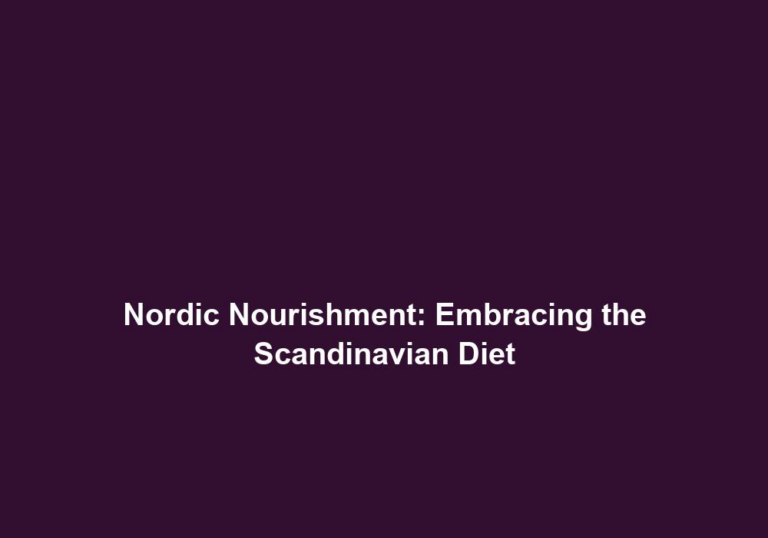Diet and Longevity: The Science Behind a Longer Lifespan
A healthy diet has long been associated with numerous health benefits, including a longer lifespan. Research and scientific studies consistently show that the foods we consume play a vital role in determining our overall health and well-being. In this article, we will delve into the science behind how diet can influence longevity and provide valuable insights into the types of foods that can promote a longer, healthier life.
The Impact of Diet on Longevity
- Reducing Chronic Diseases: A balanced and nutritious diet has been proven to reduce the risk of chronic diseases such as heart disease, cancer, and diabetes. These diseases are major contributors to premature death and can significantly impact lifespan. By adopting a diet rich in fruits, vegetables, whole grains, lean proteins, and healthy fats, individuals can lower their risk of developing chronic diseases and enhance longevity.
A balanced and nutritious diet plays a crucial role in reducing the risk of chronic diseases, which are major contributors to premature death. Heart disease, cancer, and diabetes are among the most prevalent chronic diseases that can significantly impact lifespan. By incorporating a variety of fruits, vegetables, whole grains, lean proteins, and healthy fats into our daily meals, we can provide our bodies with the necessary nutrients to lower the risk of developing these diseases.
Furthermore, fruits and vegetables are rich in antioxidants that help fight against cell damage and inflammation, which are key factors in the development of chronic diseases. Whole grains provide fiber, which aids in digestion and helps maintain healthy blood sugar levels. Lean proteins, such as poultry, fish, and legumes, are essential for muscle repair and growth, contributing to overall health and longevity. Healthy fats, like those found in avocados and nuts, can help reduce cholesterol levels and protect against heart disease. By making these dietary choices, we can actively promote a longer and healthier life.
- Maintaining a Healthy Weight: Obesity is a significant risk factor for various health conditions and can shorten lifespan. By following a well-balanced diet and maintaining a healthy weight, individuals can prevent obesity-related complications, such as cardiovascular diseases and type 2 diabetes. Consuming a diet low in processed foods, added sugars, and unhealthy fats, while focusing on portion control and regular physical activity, is crucial for weight management and promoting longevity.
Maintaining a healthy weight is essential for overall health and longevity. Obesity is a significant risk factor for various health conditions, including cardiovascular diseases, type 2 diabetes, and certain types of cancer. By following a well-balanced diet and engaging in regular physical activity, individuals can effectively manage their weight and reduce the risk of developing these obesity-related complications.
To maintain a healthy weight, it is important to focus on consuming whole, unprocessed foods and avoiding excessive intake of added sugars and unhealthy fats. Incorporating plenty of fruits and vegetables into our diet provides essential nutrients while keeping calorie intake in check. Additionally, choosing lean protein sources, such as fish, poultry, and legumes, can help build and maintain muscle mass, which in turn increases metabolism and aids in weight management.
Portion control is another key aspect of maintaining a healthy weight. By being mindful of serving sizes and listening to our body’s hunger and fullness cues, we can prevent overeating and ensure that we are consuming an appropriate amount of calories. Regular physical activity is also crucial for weight management and overall well-being. Combining a balanced diet with regular exercise promotes a healthy weight and contributes to a longer, healthier life.
- Boosting Immune Function: A well-nourished body with a strong immune system is better equipped to fight off infections and diseases. Consuming a diverse range of fruits, vegetables, nuts, seeds, and whole grains provides essential vitamins, minerals, and antioxidants that support immune function. A robust immune system can help protect against age-related diseases and infections, ultimately promoting a longer lifespan.
A strong immune system is vital for overall health and longevity. Consuming a diverse range of nutrient-rich foods can provide the essential vitamins, minerals, and antioxidants necessary to support immune function. Fruits and vegetables, particularly those high in vitamin C and other antioxidants, are known to enhance immune response and protect against infections and diseases.
Nuts and seeds are excellent sources of vitamin E, zinc, and other immune-boosting nutrients. Whole grains, such as brown rice and quinoa, provide fiber and B vitamins that support immune function. Including these foods in our diet helps ensure that our bodies are well-nourished and equipped to fight off infections and age-related diseases.
It is important to note that a healthy immune system is not solely dependent on individual nutrients, but rather on a well-balanced and varied diet. By incorporating a wide range of fruits, vegetables, nuts, seeds, and whole grains into our meals, we can strengthen our immune system and improve our body’s ability to defend against illnesses, ultimately promoting a longer lifespan.
- Reducing Inflammation: Chronic inflammation is linked to various health issues and can accelerate the aging process. Certain foods, such as processed meats, sugary snacks, and refined grains, can trigger inflammation in the body. On the other hand, an anti-inflammatory diet rich in fruits, vegetables, fatty fish, nuts, and olive oil can help reduce inflammation and promote longevity.
Chronic inflammation is a common underlying factor in many age-related diseases and can contribute to accelerated aging. It is important to be aware of the foods that can trigger inflammation in the body and those that have anti-inflammatory properties.
Processed meats, sugary snacks, and refined grains are examples of foods that can promote inflammation. These foods often contain high levels of unhealthy fats, refined sugars, and additives that can trigger an inflammatory response in the body. Consuming these foods in excess can lead to chronic inflammation, which is associated with an increased risk of various diseases, including cardiovascular diseases, arthritis, and certain types of cancer.
On the other hand, an anti-inflammatory diet can help reduce inflammation and promote longevity. Foods such as fruits, vegetables, fatty fish (such as salmon and sardines), nuts, and olive oil have been shown to have anti-inflammatory properties. These foods are rich in antioxidants, omega-3 fatty acids, and other nutrients that help reduce inflammation and protect against chronic diseases.
By incorporating more of these anti-inflammatory foods into our diet and reducing the intake of pro-inflammatory foods, we can help control inflammation levels in our body, thus promoting a longer and healthier life.
Key Components of a Longevity-Boosting Diet
- Plant-Based Foods: A plant-based diet, characterized by a high intake of fruits, vegetables, whole grains, legumes, and nuts, has been consistently associated with longevity. Plant-based foods are rich in fiber, antioxidants, vitamins, and minerals that support overall health and reduce the risk of chronic diseases. Incorporating a variety of colorful fruits and vegetables into daily meals can provide an abundance of nutrients essential for a longer lifespan.
A plant-based diet, which emphasizes the consumption of fruits, vegetables, whole grains, legumes, and nuts, has been linked to longevity and overall health. These plant-based foods are rich in fiber, antioxidants, vitamins, and minerals that are essential for maintaining good health and reducing the risk of chronic diseases.
Fruits and vegetables are packed with vitamins and minerals that support various bodily functions and contribute to optimal health. Different colored fruits and vegetables provide different types of antioxidants, which help protect against cell damage and reduce the risk of chronic diseases, such as heart disease, cancer, and neurodegenerative disorders.
Whole grains, such as brown rice, quinoa, and whole wheat, are excellent sources of fiber, B vitamins, and minerals. Legumes, including beans, lentils, and chickpeas, are rich in protein, fiber, and other nutrients that support overall health. Nuts and seeds provide healthy fats, protein, and essential nutrients, such as vitamin E and magnesium.
By incorporating a variety of colorful fruits and vegetables, whole grains, legumes, and nuts into our daily meals, we can ensure that our bodies receive a wide range of nutrients necessary for a longer lifespan and optimal health.
- Healthy Fats: Consuming healthy fats, such as those found in avocados, olive oil, nuts, and seeds, is crucial for promoting longevity. These fats are rich in monounsaturated and polyunsaturated fatty acids, which have been linked to reduced inflammation, improved heart health, and a lower risk of age-related cognitive decline. Including these healthy fats in the diet can help maintain cell membrane integrity and support brain function, contributing to a longer lifespan.
Healthy fats play a crucial role in promoting longevity and overall health. Fats are an essential macronutrient that our bodies need for various functions, including providing energy, supporting cell growth, and aiding in the absorption of certain vitamins.
Avocados, olive oil, nuts, and seeds are examples of healthy fat sources that can contribute to a longer lifespan. These foods are rich in monounsaturated and polyunsaturated fatty acids, which have been linked to numerous health benefits. These healthy fats help reduce inflammation in the body, support heart health by improving cholesterol levels, and lower the risk of age-related cognitive decline.
Including these healthy fats in our diet can help maintain the integrity of cell membranes, which are crucial for proper cell function and overall health. Moreover, these fats also support brain health and function, as the brain is composed primarily of fat and requires a steady supply of healthy fats to thrive.
By incorporating foods rich in healthy fats into our meals, such as avocados, olive oil, nuts, and seeds, we can support our overall health, promote longevity, and ensure the proper functioning of our bodies and minds.
- Lean Proteins: High-quality protein sources, such as lean meats, poultry, fish, eggs, and plant-based proteins like legumes and tofu, are essential for maintaining muscle mass, supporting tissue repair, and promoting longevity. Adequate protein intake is particularly important as we age, as it can help prevent muscle loss and maintain physical strength, ultimately leading to a longer, healthier life.
Protein is an essential nutrient that plays a crucial role in maintaining overall health and promoting longevity. High-quality protein sources, such as lean meats, poultry, fish, eggs, legumes, and tofu, provide the necessary amino acids for muscle growth, tissue repair, and various bodily functions.
As we age, maintaining muscle mass becomes increasingly important. Muscle loss, also known as sarcopenia, is a common consequence of aging and can lead to decreased mobility, increased risk of falls, and reduced overall quality of life. Adequate protein intake, in combination with regular physical activity, can help prevent muscle loss and maintain physical strength.
Incorporating lean protein sources into our diet provides the necessary building blocks for muscle repair and growth. Lean meats, such as chicken and turkey, are excellent sources of high-quality protein. Fish, such as salmon and tuna, not only provide protein but also contain omega-3 fatty acids, which have been shown to have numerous health benefits. Plant-based protein sources, like legumes and tofu, offer a protein-rich alternative for those following a vegetarian or vegan diet.
By ensuring adequate protein intake through the consumption of lean meats, poultry, fish, eggs, legumes, and tofu, we can support muscle health, promote tissue repair, and ultimately contribute to a longer, healthier life.
- Moderate Caloric Intake: Caloric restriction, without malnutrition, has consistently shown promising effects on lifespan extension in various animal studies. While further research is needed to determine the direct impact on human longevity, adopting a moderate caloric intake can help maintain a healthy weight and reduce the risk of obesity-related diseases. Balancing energy intake with physical activity is key to achieving and sustaining a moderate caloric intake for optimal longevity.
Caloric intake plays a significant role in overall health and longevity. While the direct impact of caloric restriction on human lifespan is still being studied, research on animal models has consistently shown promising effects on lifespan extension.
Adopting a moderate caloric intake can help maintain a healthy weight and reduce the risk of obesity-related diseases, such as cardiovascular diseases, type 2 diabetes, and certain types of cancer. Excess calorie consumption can lead to weight gain and contribute to the development of these chronic diseases.
Balancing energy intake with physical activity is crucial for achieving and sustaining a moderate caloric intake. Regular exercise helps burn calories, improve metabolism, and maintain muscle mass, all of which contribute to weight management and overall health.
It is important to note that caloric intake should not be restricted to the point of malnutrition. A well-balanced diet that includes all essential nutrients is necessary for optimal health. Consulting with a healthcare professional or registered dietitian can provide personalized guidance on caloric intake and overall nutrition.
- Hydration: Staying adequately hydrated is often overlooked but crucial for overall health and longevity. Water is essential for various bodily functions, including digestion, circulation, temperature regulation, and nutrient absorption. Opting for water as the primary beverage and limiting the consumption of sugary drinks can help maintain hydration levels and promote optimal cellular function, supporting a longer lifespan.
Proper hydration is essential for maintaining overall health and promoting longevity. Water is involved in numerous bodily functions, including digestion, circulation, temperature regulation, and nutrient absorption.
Staying adequately hydrated helps maintain optimal cellular function and supports the health of various organs and systems in the body. Water is essential for the transportation of nutrients and oxygen to cells, the removal of waste products, and the regulation of body temperature.
Opting for water as the primary beverage is the best way to ensure proper hydration. Other beverages, such as sugary drinks and caffeinated beverages, should be limited, as they can contribute to dehydration and have negative effects on health.
By making a conscious effort to drink an adequate amount of water throughout the day, we can maintain hydration levels, support optimal cellular function, and promote overall health and longevity.
Conclusion
In conclusion, the science behind diet and longevity is clear – what we eat significantly impacts our lifespan. By adopting a balanced, nutritious diet rich in plant-based foods, healthy fats, lean proteins, and maintaining a moderate caloric intake, we can reduce the risk of chronic diseases, maintain a healthy weight, boost immune function, and reduce inflammation. Remember, small changes in







